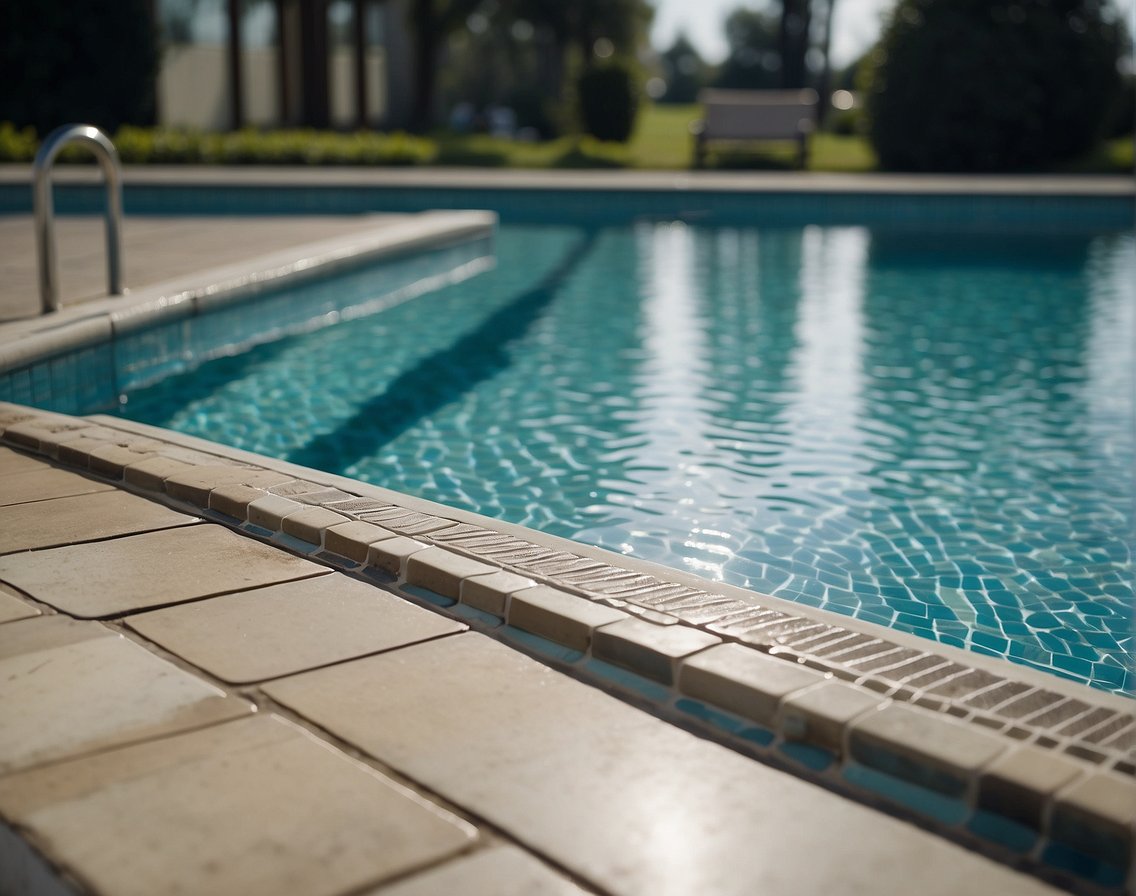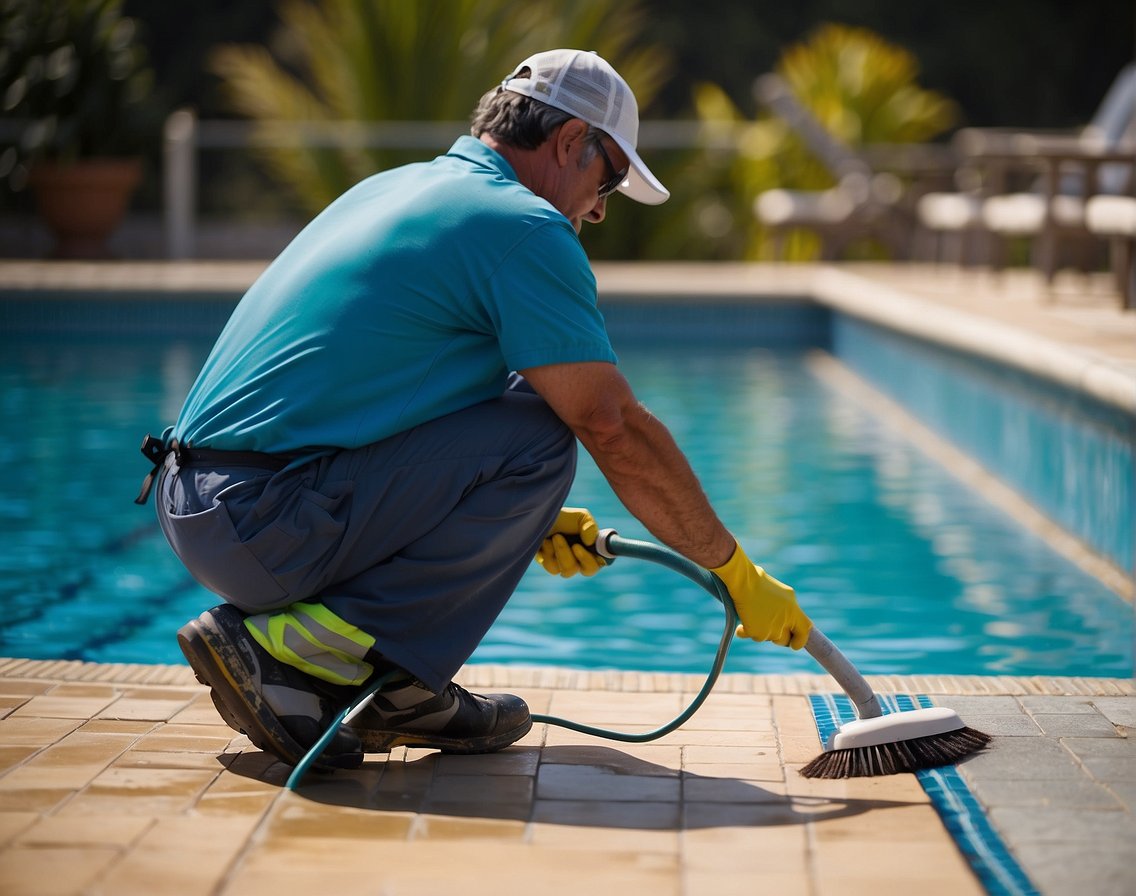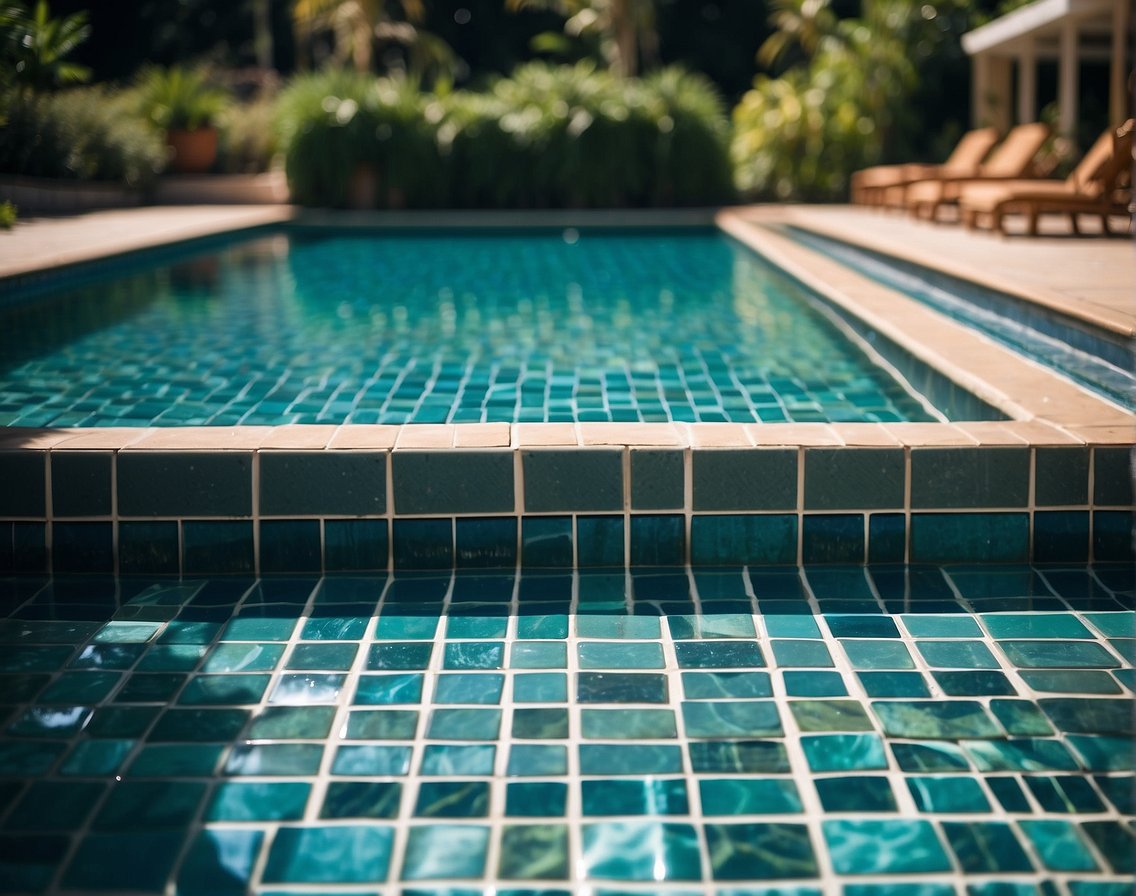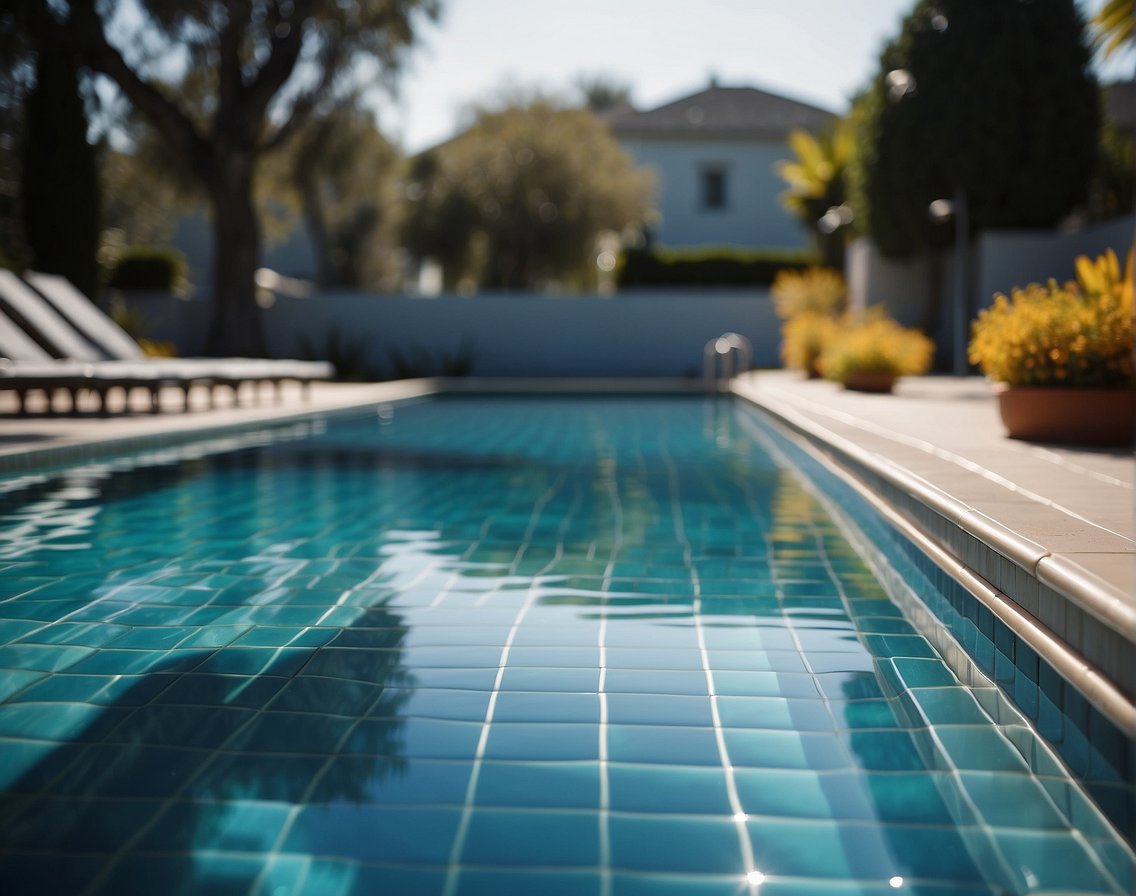Benefits of Regular Pool Tile and Grout Cleaning

Maintaining clean tiles and grout in our swimming pool is fundamental not only for the appearance but also for the health and longevity of our pool. Over time, debris, calcium deposits, and other contaminants can lead to a range of issues that regular cleaning can prevent.
Appearance: Clean tile and grout are vital for an inviting swimming pool. It can transform a dull, neglected pool into one that looks brand new with vivid colors and a welcoming ambiance.
Water Quality: Regular maintenance helps to ensure that the water remains clear and free of contaminants. By keeping the tiles and grout clean, we reduce the likelihood of dirt and debris affecting the pool’s water quality.
- Prevention of Algae Growth: Algae can quickly take root in dirty grout lines or on unclean tiles.
- Health Risks: By keeping algae at bay, we significantly minimize the potential health risks to swimmers.
To maintain the pool tile aesthetics and ensure a safe swimming environment, we employ routine cleaning and inspection. Neglecting this duty can result in a build-up that becomes harder to manage over time and may cause damage to our pool’s infrastructure.
Lastly, by investing in the upkeep of our swimming pool’s tiles and grout, we extend the lifespan of the materials, preventing premature wear and tear. This proactive measure ensures that our pool remains a source of joy and relaxation for years to come, while also protecting our investment.
Common Challenges in Pool Tile Maintenance

In maintaining the aesthetic and functional integrity of a swimming pool, overcoming common challenges is pivotal. We focus on managing algae and mildew, dealing with hard water and calcium deposits, and the regular upkeep required to prevent tile and grout damage.
Algae and Mildew Management
Algae and mildew thrive in pool environments, posing significant maintenance issues. Our goal is to maintain safe and clean water by effectively controlling these organisms. Chlorine levels should be regularly checked and balanced, as this helps inhibit algae growth. For areas already affected by mildew, a mixture of bleach and water can be used for cleaning, though care must be taken to protect the grout.
- Preventive measures include:
- Regularly testing and adjusting water chemistry.
- Incorporating algaecide into the maintenance routine.
Dealing with Hard Water and Calcium Deposits
Hard water leads to calcium buildup, which can cause unsightly staining on tiles and damage the grout’s durability. To tackle this, we use vinegar or a pH-neutral cleaner to dissolve minor deposits. For more severe cases, muriatic acid may be required, but this should be handled with caution and proper safety gear.
- Techniques include:
- Applying a vinegar solution to affected tiles.
- Using a specialized pool tile cleaner for tougher deposits.
Regular Upkeep to Prevent Damage
Regular maintenance is not just about cleanliness; it’s critical for the longevity of pool tiles and grout. We establish a maintenance routine that involves timely inspections for cracking and repairs as needed. By staying vigilant, we can prevent extensive damage that could lead to larger repair costs in the future.
- Maintenance routine components:
- Weekly brushing of tiles to remove debris.
- Yearly professional inspection to assess tile and grout condition.
Effective Cleaning Techniques and Tools

In ensuring a clean and sanitary swimming pool environment, we recognize the necessity for appropriate cleaning techniques and the selection of the right tools. Let’s explore the differences between manual and mechanical methods, how to choose suitable cleaning agents, and protective measures to take during cleaning procedures for the best results.
Manual vs Mechanical Cleaning Methods
When it comes to cleaning tiles and grout, we have the option of manual or mechanical methods. Manual cleaning usually involves tools like:
- Soft brushes or grout brushes for gentle scrubbing
- Pumice stones for removing calcium buildup
- A bucket of vinegar and warm water solution for eco-friendly cleaning
On the other hand, mechanical cleaning can be more efficient for larger areas, utilizing equipment such as:
- Pressure washers for powerful and deep cleaning
- Mechanical scrubbers that allow for thorough and uniform cleaning
We must use each method appropriately to prevent damage to grout and tiles.
Choosing the Right Cleaning Agents
Selecting the appropriate cleaning agents is crucial. We recommend:
- Mild detergents for standard cleaning, as they are effective yet gentle on tiles.
- A solution of equal parts vinegar and warm water for an eco-friendly alternative.
- Avoiding harsh chemicals and abrasive cleaners, which can erode grout and dull the finish of tiles.
Protective Measures during Cleaning
Protection during cleaning is non-negotiable to ensure our safety. Always wear:
- Gloves to safeguard our hands from cleaning agents.
- Safety goggles to protect our eyes from splashes.
Furthermore, possessing the knowledge to use all tools and agents correctly is paramount. We must always follow the manufacturer’s instructions and remember that the well-being of us and the swimming pool comes first.
Optimal Cleaning Schedule and Routine

Maintaining a swimming pool requires a well-planned cleaning schedule and routine to ensure its cleanliness and pristine condition. We need to consider the specifics of cleaning frequency and post-cleaning practices to maximize the results and longevity of our efforts.
Frequency of Cleaning for Optimal Results
Daily:
- Check and adjust water chemistry to maintain proper pH and sanitizer levels.
- Skim the surface to remove debris.
Weekly:
- Vacuum the pool to remove settled dirt and debris.
- Brush tiles and grout to prevent algae and calcium buildup.
Monthly:
- Deep clean the tiles and grout to restore their appearance.
- Inspect the filtration system to ensure efficient operation.
Bi-Annually:
- Apply grout sealer to protect against staining and deterioration.
Annual:
- Schedule a professional inspection to identify potential issues.
| Cleaning Interval | Task |
|---|---|
| Daily | Adjust chemistry, skim the surface |
| Weekly | Vacuum, brush tiles and grout |
| Monthly | Deep clean tiles and grout, inspect filtration system |
| Bi-Annually | Apply grout sealer |
| Annual | Professional inspection |
Post-Cleaning Procedures to Enhance Longevity
After cleaning, it’s crucial to take steps to preserve the pool’s condition:
- Rinse cleaned surfaces to remove any residual pool chemicals.
- Rebalance water chemistry if it was affected by the cleaning agents.
- Regularly assess the efficacy of the filtration system and make adjustments as necessary.
- Document maintenance routines to track the performance and schedule future cleanings.
Key Actions Post-Clean:
- Rinse Surfaces: Clear chemical residue.
- Water Chemistry: Ensure balance is maintained.
- Filtration Assessment: Confirm optimal functionality.
- Maintenance Log: Keep a detailed record for reference.
By sticking to a regular maintenance and cleaning schedule and by following proper post-cleaning procedures, we can effectively maintain our swimming pool in a condition that not only looks great but is also hygienic and safe for all users.
Professional Insights on Tile and Grout Care

Tile and grout are crucial to maintaining the aesthetics and hygiene of your swimming pool. Proper care is essential for preventing the buildup of grime and maintaining the integrity of the swimming pool tiles.
Advanced Techniques for Stubborn Stains
When dealing with enduring stains on pool tile and grout, standard cleaning methods may not suffice. We employ advanced techniques such as pressure washing, which utilizes high-pressure water to remove tough dirt and grime. This method can be especially effective for porous surfaces that have absorbed contaminants. For specific stains, like those from algae or mold, targeted tile cleaners containing appropriate chemicals are used to break down and eliminate the stain without damaging the integrity of the pool tiles or grout.
- Pressure Washing:
- Purpose: Removes entrenched dirt and prevents damage to tiles.
- Frequency: As needed, usually annually.
- Tile Cleaner Application:
- Method: Applied directly to stains with appropriate tools.
- Precaution: Selection based on tile material to avoid erosion.
The Importance of Expert Evaluation
Our expertise informs us that a one-size-fits-all approach doesn’t work for pool tile and grout cleaning. We consider epoxy grout a superior option due to its non-porous nature and resistance to chemicals commonly found in pools. It is essential to evaluate the state of the swimming pool tiles and the type of grout—be it epoxy grout or cement-based grout. We recommend a thorough assessment to determine the best customized cleaning strategy for your pool’s specific needs.
- Epoxy Grout versus Cement Grout:
- Epoxy Grout: Highly resistant to pool chemicals and stains.
- Cement Grout: More porous, requiring more frequent cleaning.
- Professional Evaluation:
- Objective: Ascertain the condition and needs of pool tile and grout.
- Outcome: Tailored cleaning plan that optimizes longevity and appearance.
Frequent expert evaluation can identify minor issues before they escalate, preserving the lifespan and beauty of your pool’s tiling. Our knowledge of the market’s best products and techniques ensures that your swimming pool tiles remain in pristine condition.
Frequently Asked Questions

In this section, we cover common inquiries regarding the cleaning and maintenance of swimming pool tiles and grout, providing safe and effective solutions.
What chemicals are safe to use for cleaning swimming pool tiles?
For cleaning swimming pool tiles, we recommend using pH-neutral cleaners as they are safe for both the tiles and the pool water. Avoid using abrasive chemicals that could damage the tile’s glaze or the grout.
What is the best method to remove scale from pool tiles?
To remove scale effectively, applying a pool tile descaler specifically formulated for calcium, lime, and rust removal is our suggested method. This should be followed by gentle scrubbing with a non-abrasive tool to prevent scratching the tiles.
What are the optimal techniques for cleaning pool tile grout?
For optimal cleaning of pool tile grout, we advise using a mixture specifically designed for grout cleaning or a mild bleach solution applied with a soft-bristled brush. It’s important to rinse thoroughly afterward to remove any residual cleaner.
Is vinegar an effective and safe option for cleaning swimming pool tiles?
Diluted vinegar can be a safe and natural cleaning solution for swimming pool tiles. However, it’s best used for light cleaning and may not be effective for heavy calcium deposits or algae. Always rinse the tiles with water after using vinegar.
How do you maintain tiles in a saltwater swimming pool?
For saltwater pools, regular brushing of tiles to prevent salt buildup is crucial. We also suggest monitoring the pool’s pH levels closely to prevent scale. Using a sequestrant agent can help in managing mineral deposits.
What are the recommended practices for general swimming pool tile maintenance?
For general upkeep, weekly brushing of tiles can prevent algae and scale. It’s also important to keep the pool chemistry balanced and to conduct deep cleanings periodically to keep the tiles and grout in pristine condition.
